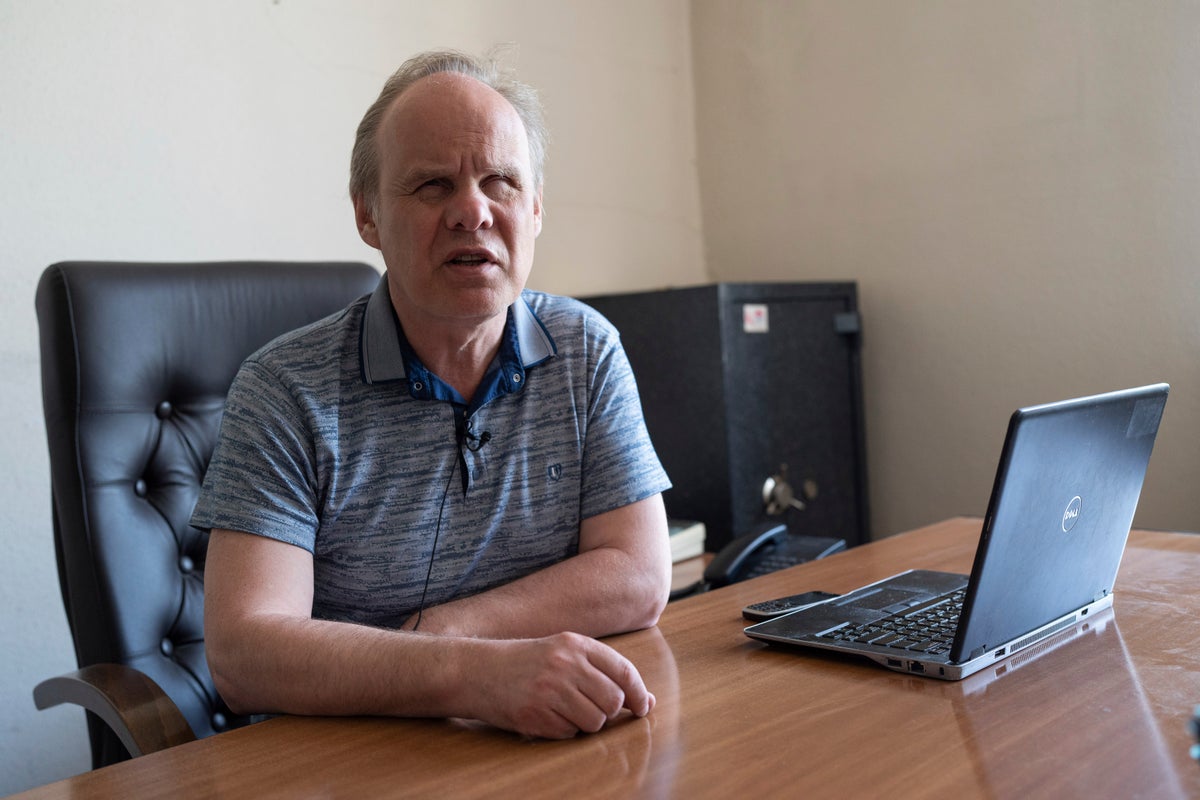
Sunlight filters through shattered windows, casting a glow upon the dusty furniture and fragments of glass strewn across the floor of the office belonging to Oleksandr Vinkovskyi, director of a Kyiv business where visually impaired people worked.
Vinkovskyi is blind, and can't see the scale of damage caused by debris from one of many Russian-fired drones on the Ukrainian capital last month. But he knows that 80 people, including 54 with a disability who used to work there manufacturing circuit breakers, sockets and hangers, are now out of work.
Most of the windows have been shattered, the doors broken, equipment ruined, and a gaping hole marks the wall on the third floor. Vinkovskyi has halted the operation for now, deeming it too dangerous for his employees.
“A visually impaired person goes to work not only to earn money, but also to communicate, interact, and be part of society in some way,” said Vinkovskyi. “And I don’t know how to estimate this loss.”
Losing the place of work is just one of a multitude of challenges that people with visual impairments face across Ukraine since Russia launched a full-scale invasion in February 2022. In the past month, when Russia predominantly targeted the capital during the night as people slept, the struggles multiplied, making it even more challenging for the visually impaired to orient themselves.
“A visually impaired person can’t locate where the explosion happened. For them, every explosion feels like it’s happening in their home,” Vinkovskyi said. “They don’t know the scale of what happened, and that brings additional stress.”
The sounds that visually impaired people rely on as their primary means of navigating their surroundings are incredibly vivid and sensitive. As a result, the explosions evoke heightened fear and distress.
Larysa Baida, the program director of the National Assembly of People with Disabilities of Ukraine, said that many individuals experience states of panic in such situations. In response, the organization has been providing psychological assistance and rehabilitation to support visually impaired people during the war.
“I’m still confused and can’t come to my senses,” said Volodymyr Holubenko, 62, who is blind and is the administrator of the business where visually impaired people worked, when recalling the day of the attack.
“I heard everything. Our doors at home were shuddering,” said Holubenko, who lives near the facility.
Holubenko, who has been working at the company for 47 years, described May as a very challenging month. However, he says he feels more protected this year compared to the previous one, when the war was in its early stages. He closely follows the news about the promises of Ukraine’s Western allies to supply anti-aircraft defense systems and eagerly awaits their delivery.
Olesia Perepechenko, executive director of nongovernmental organization Modern Sight and herself blind, says she starts hearing the missiles flying and explosions even before her husband, mother or anyone else hears them.
“I hear these sounds slightly earlier, and the anxiety comes slightly earlier. And that’s why my agitation is so acute," Perepechenko said.
She lives in the Kyiv province and said that Russia’s nightly barrages in May were particularly challenging.
“When Shaheds constantly fly over you, when the noise of drones just doesn’t stop, it drives me to hysteria. Why is it hovering above our house?” she said, referring to the Iranian-made drones that Russia frequently sends into Ukraine.
“I understand that it’s not just one hanging there — one flies by, and then a few more follow. And that noise, it becomes this long, monotonous hum of a drone.”
She finds it psychologically “very frightening” and hard to cope with in the moment that it’s happening.
“I cry, I seek solace in my mother, I hug her and comfort her or run to my husband, leaning on him.”
After one of the many attacks in May was over, she burst into tears, and grabbed ice cream from the freezer to “cope with the stress.”
“At that moment, I longed for something comforting, pleasant. And for some reason, it seemed to me that ice cream would help, although later, of course, I turned to valerian,” she said, referring to a sedative.
“People with vision impairment or blindness are vulnerable and disproportionally affected by the war,” said Ariane Laplante-Lévesque, the technical specialist in Eye and Vision and Ear and Hearing Care at the World Health Organization's Regional Office for Europe. For one, it becomes more difficult for them to navigate streets or new physical environments, she said.
Perepechenko recalls Russia’s extensive missile strikes during the winter, aimed at destroying Ukraine’s energy infrastructure. During the frequent power outages caused by the damage to power stations, Perepechenko once found herself trapped in an elevator.
“I felt like I was going to die there, suffocating,” she recalled.
Since then, she has been attending therapy sessions to overcome the constant fears for her life brought on by the war. She has found it helpful, as she plans to continue living in a country that is constantly ravaged by the ongoing war.
She also vividly recalls the challenges she faced in navigating Kyiv, where she works, and the nearby village where she lives when Russian troops withdrew from the regions last year.
“Walking was impossible. I walked with a cane, and there were constantly these anti-tank traps and pieces of burnt debris scattered on the sidewalks,” she said. “It was very dangerous and scary.”







